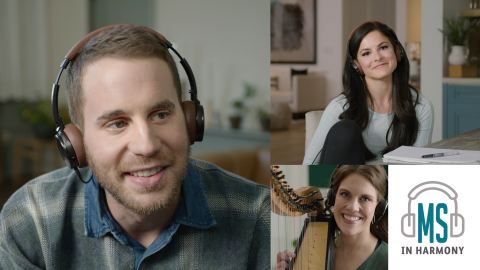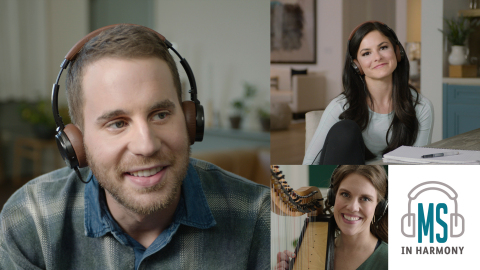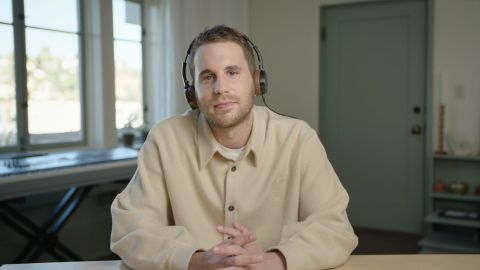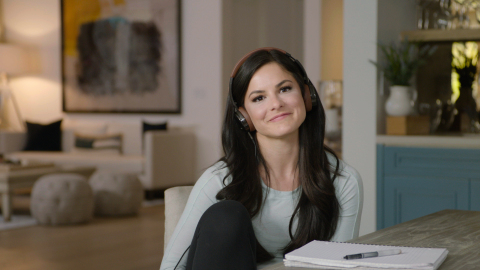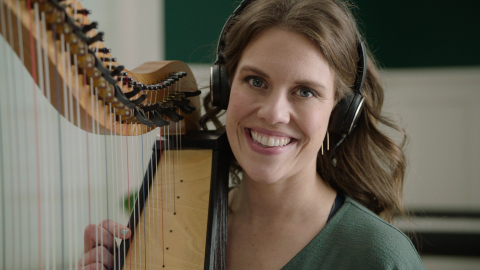PRINCETON, N.J.--(BUSINESS WIRE)--Today, Bristol Myers Squibb (NYSE:BMY) and the American Music Therapy Association, a premier organization aimed at progressing the therapeutic use of music in rehabilitation, special education, and community settings1, announce their partnership with award-winning actor, singer and songwriter Ben Platt (“The Politician,” “Dear Evan Hansen”) and his sister-in-law Courtney Platt, a dancer, choreographer and actor (“So You Think You Can Dance,” “Glee,” “VH1’s Hit the Floor,” “The Simpsons”) who lives with relapsing multiple sclerosis (RMS), to launch MS in Harmony. MS in Harmony is the first and only digital offering of its kind and guides people living with multiple sclerosis on how they may achieve mind-body harmony through music therapy.
“Music is a huge part of who I am, and it has always had the power to shift my emotional and mental state,” said Ben Platt. “Music therapy harnesses the power of music to evoke physical and mental responses,2,3,4 and I’m so proud to be involved with MS in Harmony for my sister-in-law Courtney – and everyone living with MS.”
MS is a disease of the central nervous system that affects nearly one million people in the United States.5 It can trigger a wide range of mental and physical symptoms that can be hard to predict, change over time and uniquely impact those living with the condition.6 Physical symptoms can include limb and foot numbness, difficulty walking, and balance challenges.7,8 Mental symptoms can include memory loss or worsening memory, difficulty processing information, and trouble concentrating and with divided attention.7,9 Research has shown that music therapy may have an impact on both the physical and mental symptoms of MS – as well as some of the emotional challenges that can be associated with the condition, including depression, low self-esteem, and anxiety.10,11,12,13,14 MS is a chronic condition for which there is currently no cure.15
“There’s a growing body of research on the potential benefits of music therapy for people living with MS – and still, many people living with the condition may not have the opportunity to give it a try,” explains Deborah Benkovitz Williams, President of the American Music Therapy Association. “MS in Harmony makes music therapy-based exercises widely accessible to people with MS and their care partners, and we’re proud to partner with Bristol Myers Squibb on this important initiative.”
The MS in Harmony centerpiece – MSinHarmony.com – provides educational information about the potential physical, mental and emotional effects of MS, and offers visitors an interactive and engaging opportunity to explore music therapy for themselves (and with friends and/or family) – from the safety and comforts of their own homes – through a variety of video techniques designed specifically for people living with MS and led by credentialed music therapists. Some of the videos feature Ben and Courtney Platt.
“As a lifelong dancer, a lover and believer in the power of all things musical – and someone living with relapsing MS, MS in Harmony is an amazing experience for me. I’m so glad to have music therapy as another tool to help me manage my condition – and I am so incredibly excited to be able to share the potential of music therapy with the rest of the MS community,” said Courtney Platt.
In an effort to help spread mind-body harmony across Instagram, Courtney Platt is kicking off the #MSinHarmony social challenge – and asking everyone (those with MS – and others as well!) to dance and sing it out to their favorite song, share their video on Instagram, tag #MSinHarmony, and challenge three others to do the same. Anyone can follow the challenge on Instagram via @MSinHarmony.
“At Bristol Myers Squibb, patients are our purpose,” said Tina Deignan, Senior Vice President, and U.S. Business Unit Head for Immunology at Bristol Myers Squibb. “The experiences and stories of people living with MS, like Courtney, inspire and drive us to push beyond conventional solutions to serious diseases, and we're thrilled to have the chance to share music therapy with the MS community through MS in Harmony.”
To learn more – and experience the power of music therapy, visit MSinHarmony.com.
About Multiple Sclerosis
Multiple sclerosis (MS) is a disease of the central nervous system that affects nearly one million people in the United States.5 With MS, the immune system attacks the protective myelin sheath that covers the nerves.16 The myelin damage disrupts communication between the brain and the rest of the body.17 It can trigger a wide range of mental and physical symptoms that can be hard to predict, change over time and uniquely impact those living with the condition.6 Ultimately, the nerves themselves may deteriorate — a process that's currently irreversible.18
Relapsing multiple sclerosis (RMS), including clinically isolated syndrome, relapsing remitting disease, and active secondary progressive disease, is characterized by defined attacks of worsening neurologic function.19 These attacks — often called relapses, flare-ups or exacerbations — are followed by partial or complete recovery periods (remissions), during which symptoms improve partially or completely with no apparent progression of disease.19 RMS is the most common disease course at the time of diagnosis.19
About Bristol Myers Squibb
Bristol Myers Squibb is a global biopharmaceutical company whose mission is to discover, develop and deliver innovative medicines that help patients prevail over serious diseases. For more information, visit us at MSinHarmony.com or follow BMS on LinkedIn, Twitter, YouTube, Facebook and Instagram.
About the American Music Therapy Association
The American Music Therapy Association is a nonprofit based in Silver Spring, MD whose mission is to advance public awareness of the benefits of music therapy and increase access to quality music therapy services in a rapidly changing world. For more information about the American Music Therapy Association, visit us at musictherapy.org or follow us on Twitter, Facebook and Instagram.
____________________________________
1 About the American Music Therapy Association. American Music Therapy Association. https://www.musictherapy.org/about/amta/. Accessed December 15, 2020.
2 Mori K, Iwanaga M. Two types of peak emotional responses to music: The psychophysiology of chills and tears. Sci Rep. 2017;7:46063. Published 2017 Apr 7. doi:10.1038/srep46063
3 Blood AJ, Zatorre RJ. Intensely pleasurable responses to music correlate with activity in brain regions implicated in reward and emotion. Proc Natl Acad Sci U S A. 2001;98(20):11818-11823. doi:10.1073/pnas.191355898.
4 Arjmand H-A, Hohagen J, Paton B and Rickard NS (2017) Emotional Responses to Music: Shifts in Frontal Brain Asymmetry Mark Periods of Musical Change. Front. Psychol. 8:2044. doi: 10.3389/fpsyg.2017.02044
5 How Many People Live with MS? National Multiple Sclerosis Society. https://www.nationalmssociety.org/What-is-MS/How-Many-People. Accessed December 15, 2020.
6 MS the Disease. National Multiple Sclerosis Society. https://www.nationalmssociety.org/About-the-Society/Newsroom/MS-the-Disease. Accessed December 15, 2020.
7 MS Symptoms. National Multiple Sclerosis Society.
https://www.nationalmssociety.org/Symptoms-Diagnosis/MS-Symptoms. Accessed November 25, 2020.
8 Gait or Walk Problems: The Basic Facts Multiple Sclerosis. National Multiple Sclerosis Society. https://www.nationalmssociety.org/NationalMSSociety/media/MSNationalFiles/Brochures/Brochure-Gait-or-Walking-Problems.pdf. Accessed December 15, 2020.
9 Speech Problems. National Multiple Sclerosis Society. https://www.nationalmssociety.org/Symptoms-Diagnosis/MS-Symptoms/Speech-Disorders. Accessed November 25, 2020.
10 Gallagher L and Bethoux F. Therapeutic use of the arts for patients with multiple sclerosis. US Neurology. 2017;13(2):82–9. doi:10.17925/USN.2017.13.02.82
11 Aldridge D, Schmid W, Kaeder M, Schmidt C, Ostermann T. Functionality or aesthetics? A pilot study of music therapy in the treatment of multiple sclerosis patients. Complement Ther Med. 2005;13(1):25-33. doi:10.1016/j.ctim.2005.01.004
12 Emotional Changes. National Multiple Sclerosis Society. https://www.nationalmssociety.org/Symptoms-Diagnosis/MS-Symptoms/Emotional-Changes. Accessed December 15, 2020.
13 Thaut M, Peterson D, McIntosh G, Hoemberg V. Music mnemonics aid verbal memory and induce learning – _related brain plasticity in multiple sclerosis. Front Hum Neurosci. 2014;8:395. Published 2014 Jun 13.
14 Ghai S, Ghai I. Effects of Rhythmic Auditory Cueing in Gait Rehabilitation for Multiple Sclerosis: A Mini Systematic Review and Meta-Analysis. Front Neurol. 2018;9:386. Published 2018 Jun 11. doi:10.3389/fneur.2018.00386
15 National Multiple Sclerosis Society, Comprehensive Care. https://www.nationalmssociety.org/Treating-MS/Comprehensive-Care. Accessed November 25, 2020.
16 Definition of MS. National Multiple Sclerosis Society. https://www.nationalmssociety.org/What-is-MS/Definition-of-MS. Accessed December 15, 2020.
17 What is Myelin? National Multiple Sclerosis Society. https://www.nationalmssociety.org/Treating-MS/Comprehensive-Care. Accessed December 15, 2020.
18 AJMC. The Pathologic Foundations of Multiple Sclerosis: Current Considerations. https://www.ajmc.com/view/the-pathologic-foundations-of-multiple-sclerosis-current-considerations. Accessed December 15, 2020.
19 Relapsing-remitting MS (RRMS). https://www.nationalmssociety.org/What-is-MS/Types-of-MS/Relapsing-remitting-MS. Accessed December 15, 2020.
corporatefinancial-news

